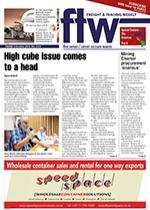The South African government has missed an opportunity to deal with remote-controlled or artificial intelligence-controlled ships in its redrafted Merchant Shipping Bill currently before Parliament.
This was despite the fact that there was a hole in our legislative framework to cope with autonomous ships, said Malcolm Hartwell, director at Norton Rose Fulbright. Considering South Africa’s new maritime legislation was only published in March this year, it could have addressed this growing international issue.
“South Africa, along with most of the world, has a huge amount of work to do before remote-controlled or autonomous ships operate in our waters,” said Hartwell. But with crewless ships already a reality owners, financiers, insurers and regulators will have to get a move on getting to grips with the numerous regulatory and legal challenges that the move towards fully autonomous ships is going to bring.
“The vast majority of regulatory regimes place an obligation on the master and crew of the vessel to, for example, keep a lookout, navigate safely, avoid collisions and avoid damage to the environment. Those regimes then impose liability on the owners of the ship and/or the employers of the master and crew, usually based on the negligent acts or omissions of the master and crew,” explained Hartwell. “Remove the master and crew and many of these regulatory and liability regimes become hollow shells. It is relatively easy to conceive transferring responsibility for safe lookout and safe navigation from the officer of the watch to the remote-control operator sitting ashore. If, however, there is no human in the decision-making loop, the position becomes far more complicated. The default position may be that liability will automatically attach to the operators of a vessel. Most legal systems are however uncomfortable with attaching strict liability to somebody for all consequences of a particular operation.”
He said the move towards autonomous vessels would have a huge impact on liability regimes and insurance for the manufacturers and suppliers of equipment.
“There is no doubt the regulatory regimes will need to be reviewed to create more certainty about responsibility and liability. This in turn will require insurers to understand the risks that they will be faced with once remote control and autonomous ships become more common,” said Hartwell.
South Africa, along with most of the world, has a huge amount of work to do before remote-controlled or autonomous ships operate in our waters. – Malcolm Hartwell

